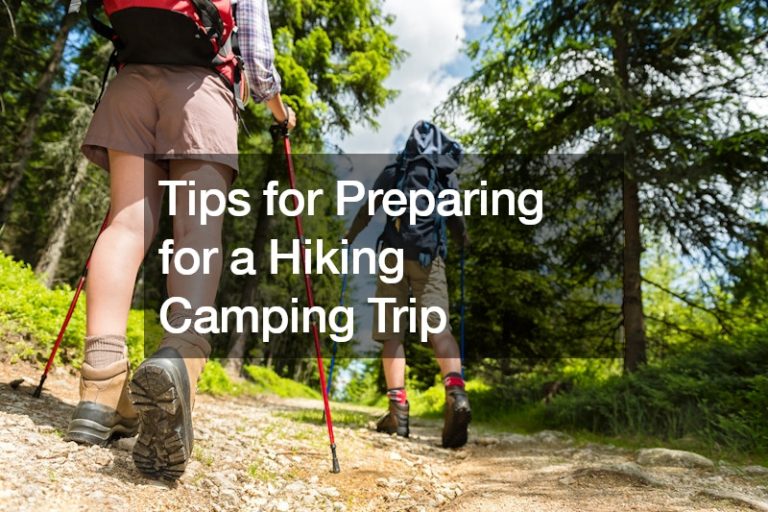Did you just get out of a timeshare? Perhaps you’re ready for a low-maintenance vacation that only requires your partner, your dog, your car, and yummy food. If you’d like to take on the excitement of a hiking camping trip, whether you’re a seasoned outdoor enthusiast or a beginner, these tips will help ensure you have a safe and enjoyable adventure.
Prepare Your Home for Your Time Away

Preparing your home before leaving for a trip is crucial to ensure peace of mind and the security of your property. Here’s how to make sure everything is in order before you depart. Firstly, secure all doors and windows. Double-check that every entry point to your home is locked, including basement and attic windows. Consider investing in smart locks or a home security system for added protection, allowing you to monitor your home remotely. Next, unplug electronic devices and appliances to prevent energy wastage and reduce the risk of electrical fires. This includes TVs, computers, chargers, and kitchen appliances. Turn off the water supply to prevent any potential leaks or flooding while you’re away.
Set timers for lights and possibly a radio or TV to create the illusion that someone is home. This can deter potential burglars. Alternatively, ask a trusted neighbor or friend to stop by periodically to collect mail, newspapers, and packages, and to check on the house. Dispose of any perishable food items to avoid returning to a foul-smelling home and potential pest infestations. Empty the trash cans and clean out the refrigerator to prevent unpleasant odors from developing. Adjust the thermostat to save energy while maintaining a safe temperature for any pets or plants left behind. If you have indoor plants, water them thoroughly before leaving or consider moving them to a location with natural light if you’ll be away for an extended period.
Secure valuable items such as jewelry, important documents, and spare keys in a locked safe or a hidden spot that’s not easily accessible. Avoid leaving these items out in the open where they could be seen through windows or by anyone entering your home. Finally, inform a trusted friend or family member of your travel plans, including your itinerary and contact information. This way, they can reach you in case of an emergency and keep an eye on your home while you’re away. By taking these precautions, you can relax and enjoy your trip knowing that your home is safe and secure in your absence.
Choose the Right Camping Gear
When getting ready for a hiking camping trip, selecting the right gear is crucial to ensure a smooth and comfortable experience in the great outdoors. The first step is to determine what essential gear you will need for your trip, such as a sturdy tent, sleeping bag, hiking boots, and backpack. It is important to make sure your gear is in good condition before setting out on your adventure. Inspect your equipment for any damage or wear and tear, and make any necessary repairs or replacements to avoid any issues during your trip. For those looking for affordable gear options, consider visiting an online camping supply store or local outdoor gear rental shops to find budget-friendly alternatives. Don’t forget your sleep medicine, daily supplements, and other medications you need to take while you pack.
What gear is essential for a hiking camping trip?
When it comes to essential gear for a hiking camping trip, some items are non-negotiable. These include a reliable tent for shelter, a high-quality sleeping bag for warmth, a comfortable backpack to carry your belongings, sturdy hiking boots for traction, and appropriate clothing for varying weather conditions. Additionally, items like a multi-tool, headlamp, water filtration system, and first aid kit should not be overlooked when packing for your trip.
Check Your Gear

Before embarking on your hiking camping trip, it is essential to inspect all of your gear to ensure it is in good working condition. Check for any tears, rips, or broken parts on your tent, sleeping bag, and backpack. Test your stove and water filter to make sure they are functioning properly. Additionally, check the condition of your hiking boots, ensuring there are no signs of wear that could lead to discomfort or blisters while on the trail.
For those looking to save money on gear for their hiking camping trip, there are several options available. Online camping supply stores often offer discounted prices on a wide range of outdoor equipment. Renting gear from local outdoor shops is another cost-effective solution, especially for items that you may not use frequently. Additionally, keep an eye out for sales at outdoor retailers or consider purchasing gently used gear from online marketplaces or gear swap events.
Plan Your Route
Planning your driving route to your campsite is another crucial step to take. Be sure you have the electronics and proper charges you need so you can GPS to the campsite with your phone. Pack snacks, crossword puzzle books for adults, coloring books, and other activities to keep yourself busy when you’re not driving. Also, be sure your car is in great shape before leaving; schedule fixes with an auto glass repair company if necessary, get an oil change, and get your tires filled with air! You don’t want to have to contact defective car lawyers during your trip.
Next comes your hiking route. Take the time to research and select a hiking trail that aligns with your skill level and interests. Consider factors such as distance, elevation gain, terrain difficulty, and any points of interest along the way. Utilize online resources, hiking guidebooks, and trail maps to help you plan your route effectively. Checking the weather forecast for the area you will be hiking in is also essential to ensure you are prepared for any potential weather-related challenges.
When choosing a hiking trail for your camping trip, it is important to consider your skill level and hiking experience. Opt for trails that are within your fitness level and comfort zone to ensure a safe and enjoyable journey. If you are a beginner hiker, start with shorter, well-marked trails that are known for being beginner-friendly. More experienced hikers may want to challenge themselves with longer, more strenuous trails that offer rewarding views and terrain.
Check Out Resources for Your Trip

There are various resources available to help hikers plan their routes for camping trips. Online hiking forums and websites provide valuable information on trail conditions, difficulty levels, and user reviews. Hiking guidebooks offer detailed descriptions of trails, including maps, elevation profiles, and points of interest. Local ranger stations and visitor centers can provide up-to-date information on trail closures, permits, and current conditions. Utilizing these resources can help you create a well-informed and safe hiking itinerary.
Weather conditions can have a significant impact on your hiking camping trip, so it is important to consider them when planning your route. Check the forecast for the area you will be hiking in to determine what weather conditions to expect during your trip. Pack appropriate clothing and gear based on the forecasted temperatures, precipitation, and wind patterns. Be prepared to adjust your hiking itinerary if severe weather is predicted, as your safety should always be the top priority when exploring the outdoors.
Pack Efficiently
When preparing for a hiking camping trip, packing efficiently can make a world of difference in the comfort and convenience of your journey. To maximize space in your backpack, use packing cubes or dry bags to organize and compress your clothing, gear, and other essentials. Consider lightweight alternatives for common camping items to reduce the weight of your pack without sacrificing functionality. When packing food for your trip, opt for dehydrated meals, trail mix, and energy bars to minimize bulk and maximize nutrition.
Space-saving packing tips can help you make the most of the limited room in your backpack while preparing for a hiking camping trip. Roll your clothing instead of folding it to save space and prevent wrinkles. Use packing cubes or compression sacks to organize and compress your items efficiently. Pack items inside your cookware, such as spices or small gear, to utilize every inch of space in your pack.
Choose the Right Food
When packing food for your hiking camping trip, it is essential to consider weight, bulk, and nutritional value. Opt for lightweight and calorie-dense options such as dehydrated meals, rice, pasta, and dried fruits. Pack non-perishable items like energy bars, trail mix, and jerky for quick and convenient snacks on the trail. Remember to pack a sufficient amount of food to fuel your activities, but avoid overpacking to reduce the weight of your pack. You may buy grass fed beef online to cook cheeseburgers at your campsite as well as Italian sausage or hot dogs!
When aiming to reduce the weight of your pack for a hiking camping trip, consider replacing heavier items with lightweight alternatives. Choose a lightweight tent made of ultralight materials like silnylon or cuben fiber to save weight without compromising durability. Opt for a down sleeping bag instead of a synthetic one for superior warmth-to-weight ratio. Invest in a lightweight backpack with adjustable straps and a supportive frame to comfortably carry your gear on the trail.
Remain Safe

Safety is paramount when venturing into the great outdoors, and camping is no exception. Whether you’re a seasoned outdoor enthusiast or a novice camper, being prepared and aware of potential risks can make your camping experience not only enjoyable but also safe. Here are some essential safety precautions to consider while camping: First and foremost, familiarize yourself with the area where you plan to camp. Research the local wildlife, terrain, weather patterns, and any potential hazards specific to the region. Understanding the environment will help you prepare accordingly.
When setting up your campsite, choose a safe and suitable location. You may have a site with a waterproof deck system with a cover to protect a grill from getting wet. However, it’s important for the space you’ll be sleeping to be on flat ground away from cliffs, unstable slopes, or dead trees that could pose a risk of falling. Avoid setting up camp in low-lying areas prone to flooding, especially during rainy seasons. Ensure you have the proper gear and equipment for your camping trip, including a reliable tent, sleeping bag, cooking supplies, and appropriate clothing for the weather conditions. Inspect your gear before departure to make sure everything is in good working condition.
Stay informed about weather forecasts for the duration of your camping trip. Be prepared for sudden changes in weather by packing extra layers, rain gear, and sufficient shelter to seek refuge if needed. Practice proper fire safety at all times. If campfires are permitted, use designated fire pits and follow local regulations. Keep a bucket of water or sand nearby to extinguish the fire completely before leaving the area or going to bed.
Store food securely to prevent attracting wildlife to your campsite. Use bear-proof containers or hang food in a bear bag away from your tent. Never leave food or garbage unattended, as it can attract unwanted visitors. Be mindful of your surroundings and wildlife encounters. While you may not be aware of the plant metabolism process, it’s crucial to understand which plants to stay away from, such as poison ivy! Also, respect the natural habitat and observe wildlife from a safe distance. Do not approach or feed wild animals, as this can be dangerous for both you and the animals.
Lastly, always inform someone of your camping plans, including your itinerary and expected return date. In case of an emergency, having someone aware of your whereabouts can expedite search and rescue efforts. By following these safety precautions and exercising caution while camping, you can minimize risks and enjoy a safe and memorable outdoor experience.
Understand First Aid Basics
When venturing into the great outdoors, having a solid grasp of first aid basics is paramount. Whether you’re an experienced camper or a novice explorer, understanding how to handle common outdoor emergencies can make all the difference in ensuring a safe and enjoyable trip.
One of the most fundamental skills in camping first aid is knowing how to handle minor cuts, scrapes, and burns. Always carry a well-stocked first aid kit containing bandages, antiseptic wipes, gauze pads, and burn cream. Cleanse wounds with water and mild soap, then apply an antiseptic and cover with a bandage to prevent infection. For burns, cool the affected area with cold water and apply burn cream or aloe vera gel to soothe the skin.
Another crucial aspect of camping first aid is knowing how to recognize and treat heat-related illnesses. In hot weather, campers are susceptible to heat exhaustion and heatstroke. Symptoms include profuse sweating, dizziness, nausea, and confusion. If someone exhibits signs of heat exhaustion, move them to a cooler area, have them rest, and give them plenty of water. If symptoms worsen or if heatstroke is suspected (manifested by hot, dry skin and altered mental status), seek medical help immediately and cool the person down by applying wet cloths and fanning them.
Furthermore, understanding how to handle injuries from wildlife encounters is essential. In case of bites or stings from insects, snakes, or other creatures, clean the affected area thoroughly and apply an antiseptic. Keep an eye on the individual for signs of allergic reactions or infection, and seek medical assistance if necessary.
Lastly, being prepared for medical emergencies in remote locations is crucial. Make sure to have a communication device, such as a cellphone or satellite phone, and know how to signal for help in case of an emergency. Familiarize yourself with basic CPR and wilderness first aid techniques, and consider taking a first aid course before embarking on your camping trip. By equipping yourself with knowledge of first aid basics, you can enjoy the beauty of nature with confidence, knowing that you’re prepared to handle any unexpected situations that may arise while camping.
By following these tips for preparing for a hiking camping trip, you’ll be well-equipped to tackle the great outdoors with confidence. Remember to plan ahead, stay safe, and most importantly, have fun on your adventures!




